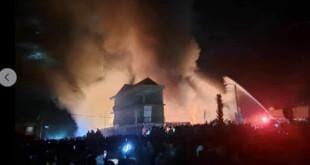June 12, 2013
Mr. Antonio Guterres
United Nations High Commissioner for Refugees (UNHCR)
Case Postale 2500
CH-1211 Genève 2 Dépôt Suisse.
Email: InfoDesk@ohchr.org; GUTERRES@unhcr.org
OSA’s Appeal Letter to the United Nations High Commissioner for Refugees (UNHCR)
RE: Urgent Action Needed to Protect Oromo Refugees in Egypt
Dear Mr. Guterres,
I am writing this urgent letter on behalf of the Oromo Studies Association (OSA), a scholarly, multi-disciplinary, and non-profit international organization established to promote studies relevant to the Oromo people and other peoples of the Horn of Africa. We are gravely concerned over the current situation of the Oromo refugees in Egypt because we have received reports from the Oromo refugee community of Egypt that some Egyptian youth groups have verbally and physically attacked some members of their community. These Egyptian groups are angry by the current escalation of disputes over the diversion of the Blue Nile from its course by the so-called Renaissance Dam being built by the Ethiopian government. As you know, the Oromo refugee community is alarmed by the attacks, and currently holding protest in front of the UNHCR office in Cairo. Members of this community are staging demonstration four days and four nights in front of the UNHCR office in Cairo demanding protection from attacks, abuses and human rights violations. They told me that they have decided to stay there until they get protection since they are scared for their lives to go back to their homes.
Oromo Refugee Community in Cairo: demonstrating and sleeping in front of the UNHCR office for four consecutive days (June 9 – 12, 2013)
On May 30, 2013, a 25 year-old Oromo woman was attacked when she was going to Ambabarsum Hospital in Helwan area of the city for a medical follow up. She was pushed under a Tuktuk car by an unknown group of people and her face and other parts of her body were severely injured. An eye witnesses said that she was attacked after she mentioned that she was from Ethiopia. Furthermore, on June 7, 2013 a group of Egyptians broke into an apartment of Oromo residents and attacked two men and a woman. The attacked Oromos said that the attackers live in the same apartment complex and know that they are refugees from Ethiopia. These Egyptians violently attacked these Oromo refugees by knife and Pepsi bottle to a point that the refugees lost their consciousness. They kicked the woman in her stomach, who was a five months pregnant, causing her a severe bleeding. Although she was later taken to a hospital by the help of other Oromo refugees, she was denied treatment at least from two hospitals after they identified their identity from their UNHCR ID card. These attacked refugees said that the attackers were telling them “we will cut your necks as your government has cut our water”.
Another Oromo refugee who was attacked in a similar situation testified on the Voice of America Afaan Oromoo Service Program on Monday, June 10, 2013 that he was also verbally abused and threatened by the police. Many other Oromo refugees have also complained that they are having difficulties getting cooperation and protection from the Egyptian police and denied medical treatment for their wounds from Egyptian doctors and medical centers. These are fundamental human rights violations, and the UNHCR has moral and legal obligations to defend and protect these Oromo refugees by implementing the UN Universal Declaration of Human Rights.
Dear Mr. Guterres,
The Oromo refugees have fled their country because of sectarian persecution and gross human rights violations by the Tigrayan-led Ethiopian government. As we explained to you in our letter [1]of April 9, 2013, the current government in Ethiopia is controlled by the Tigrayan People’s Liberation Front (TPLF), a group originating from the Tigrayi regional state in the north that comprises only about 6% of the Ethiopian population. This minority government hates and fears the Oromo population, which constitute more than 40% of the Ethiopian population. This is the root cause for the large exodus of Oromo refugees and their immigration to North Africa, the Middle East, Europe, Australia, and North America. These refugees have left their homeland to escape persecution due to their national origin (Oromoness) and their political conviction. Many are survivors of torture and other forms of inhuman and ill-treatment by the Ethiopian regime. They have nothing to do with the adventurous and ill-advised decision of the regime to divert the Blue Nile and create a hostile atmosphere with the people and government of Egypt.
The Oromo were free people with their own democratic system of administration known as Gadaa prior to the invasion and incorporation of their country, Oromia, by Abyssinians during the last decades of the nineteenth century. European colonial powers supported and implemented the Ethiopian colonial project. Since then the Oromo have remained subjects of successive Ethiopian rulers. They are seen as enemies on their own homeland by the same state that took away their land and their country by force of arms. With their land they lost their
freedom, their livelihood, their democratic system of government, and their dignity. They are also on the verge completely losing their identity, their custom, and their language. Their oppression is manifested by the fact that they constitute the largest prison population in Ethiopia and the largest proportion of Ethiopian refugees in North Africa and the Middle East. The Oromo are unable to live in peace in their own country and the Diaspora. It is unfortunate that they are also unable to live in peace as refugees in other countries. With the intense political climate between Egypt and the regime in Ethiopia, it seems now that these refugees are found at the wrong place at the wrong time. If the UNHCR doesn’t act swiftly and find a solution, the Oromo refugees in Egypt may face a similar tragic situation that the Oromo refugees faced in Tripoli and Benghazi, Libya two years ago. We recall that at least 63 Oromo refugees died[1] when they were trying to escape the conflict in Libya by boat and attempting to go to Italy.
On behalf of the Oromo refugees dispersed all over the world, I would like to appeal to the UNHCR to provide immediate and appropriate protection and care for the Oromo refugees in Egypt. An urgent solution is needed to spare the lives of these refugees including relocating them to other countries. Historical facts and objective situations on the ground corroborate that the Oromo are a persecuted people in their own homeland and Oromo refugees have to be classified as such by the UNHCR in order to facilitate their resettlement to other countries. The Oromo refugees do not have a government of their own to protect them. UNHCR is their only institution that can defend and protect them. It is their only guardian and their only hope. Therefore, I appeal to you so that you can find an appropriate solution for the current problem of the Oromo refugees in Egypt.
I also appeal to the government and the people of Egypt to differentiate the culprit from the victim. The Egyptians should realize that the Oromo refugees are victims of the Ethiopian regime themselves. They left their homeland to escape jail, torture and death threat by the current Ethiopian government. The same government that took away their homeland and their freedom and made them refugees is now constructing the controversial dam threatening the livelihood of the Egyptians. The Egyptian people will not find more friendly people than the Oromo, who will not pose any threat to the future of Egypt. Helping the Oromo refugees, we believe, is a wise investment in the future of good will between the Egyptians and the Oromo, who constitute the single largest national group in the Horn of Africa and Eastern Africa. It is unfortunate that, the Oromo refugees who should have been seen as best friends and allies, are seen as enemies by some misinformed Egyptians. I also request the Egyptian authorities to protect the lives and rights of Oromo refugees in their country.
Sincerely,
Mosisa Aga, Ph.D.
OSA President
CC:
His Excellency Mohamed Kamel Amr
Minister of Foreign Affairs
Masbero-Kornish El Nile St. Cairo
Phone: 25749817
Email: Contact.Us@mfa.gov
His Excellency Mohamed Ahmed Ibrahim Mohamed Mostafa
Minister of Interior Affairs
El Sheikh Rihan St.Cairo, Postal Code 11641
Phone: 27948300
Email: center@iscmi.gov.eg
Mr. Bekele Geleta
International Federation of Red Cross
and Red Crescent Societies
P.O. Box 372
CH-1211 Geneva 19
Switzerland
Email: info@redcross.ch
UNHCR Cairo: E-mail Address: – areca@unhcr.org
UNHCR Regional Representative – Mr. Mohamed Dayri, E-mail: dayri@unhcr.org
Deputy Regional Represetative – Mrs. Elizabeth Tan, E-mail: tan@unhcr.org
Africa and Middle-East Refugee Assistance (AMERA), E-mail: info@amera-uk.org
AMERA- Egypt Regional Director – Hesham Issa, E-mail: HIssa@amera-uk.org
International Organization for Migration (IOM), E-mail: ic@iom.int
His Excellency Ambassador
The Australian Embassy in Cairo
Cairo, Egypt
Phone: +20 2 2770 6600
Fax: +20 2 2770 6650
Email: cairo.austremb@dfat.gov.au
His Excellency Ambassador
Embassy of Canada in Cairo, Egypt
26 Kamel El Shenawy St., Garden City
Cairo, Egypt
Phone: (011 20 2) 2791-8700
Fax: (011 20 2) 2791-8860
Email: cairo-cs@international.gc.ca
His Excellency Ambassador
German Embassy in Cairo, Egypt
Embassy of Germany in Cairo, Egypt
2, Sh. Hassan Sabri
Zamalek
Phone: (00202) 739-9600
Fax: (00202) 736-0530
Email: germemb@tedata.net.eg
His Excellency Ambassador
Royal Norwegian Embassy in Cairo, Egypt
8 El Gezirah Street
Zamalek
City: Cairo
Phone: +20 2 2735 8046 / 2735 3340 / 2736 3955
Fax: +202 7370709
Website: http://www.norway-egypt.org/
Email: emb.cairo@mfa.no
His Excellency Ambassador
Embassy of Sweden in Cairo, Egypt
13, Mohamed Mahzar Street
Zamalek, Cairo
Postal Address: P.O. Box 131
112 11 Zamalek
Cairo, Egypt
City: Cairo
Phone: +20 (2) 728 9200
Fax: +20 (2) 735 4357
Email: ambassaden.kairo@foreign.ministry.se
His Excellency Ambassador
Embassy of Switzerland in Egypt
10, Abdel Khalek Saroit
Phone: (+20-2) 5758284
Fax: (+20-2) 5745236
Email: vertretung@cai.rep.admin.ch
His Excellency Ambassador
British Embassy in Cairo, Egypt
7 Ahmed Rageb Street
Garden City, Cairo
Phone: (002) (02) 27916000
Fax: (002) (02) 2791 6130
Email: info@britishembassy.org.eg
His Excellency Ambassador
Embassy of United States in Cairo, Egypt
8 Kamal el-Din Salah Street,
Garden City, Cairo, Egypt
Phone: [20] [2] 797-3300
Email: consularcairo@state.gov
His Excellency Ambassador
Embassy of Ireland in Egypt
22 Hassan Assem St
Zamalek
Phone: Telephone: +202 27358264, Visa Phone: +202 27356417
Fax: +202 27362863
Email: cairoembassy@dfa.ie
His Excellency Ambassador
Royal Netherlands Embassy in Cairo, Egypt
18, Hassan Sabri
11211 Zamalek
Phone: +20 2 2739 5500
Fax: +20 2 2736 5249
Email: kai@minbuza.nl





